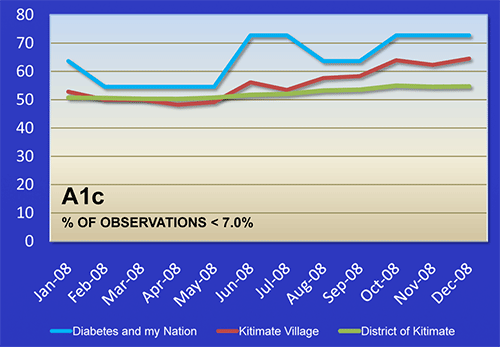Community Based Diabetes Prevention and Management Program

According to the International Diabetes federation, "Currently there are 370 million indigenous people worldwide, representing 5% of the world's population. While the percentage of indigenous peoples is low, the burden of diabetes on indigenous peoples is undeniable. 50% of indigenous adults over 35 years of age have type 2 diabetes."
Diabetes is reaching an epidemic stage among Aboriginal people. It is estimated that approximately 48% of the First Nations population above 45 years old in Canada have diabetes. Aboriginal children are also now being diagnosed with Type 2 diabetes, a condition that in the past occurred mainly in older persons. Through community initiatives, based on traditional holistic and western medicine integrated approaches, building trust, and respect of peoples cultures and traditions; diabetes can be prevented and managed.
Empowerment through knowledge and ownership of the challenge is what Diabetes and My Nation is about. A model developed by Diabetes Task Force Solutions , the program was implemented at the Haisla First Nation.
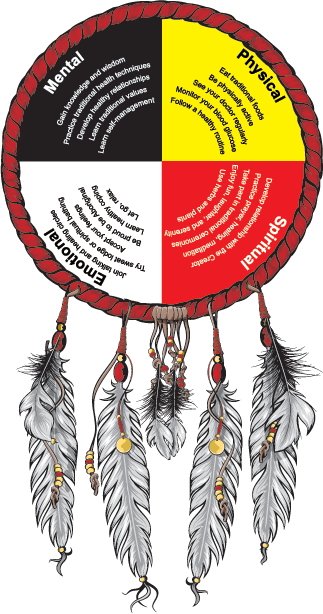
The Team
Diabetes Task Force Solutions is a team of professional healthcare providers, and patients with considerable business expertise, to ensure that our solutions are evidence based, comprehensive, cost effective, and sustainable. DTFS has worked with a group of First Nations elders with vast experience in the fields of health management, residential schools, education, and First Nations healthcare providers to customize and implement Diabetes and My Nation.
Mission statement
Improve the health outcomes of the Aboriginal people living with diabetes and other chronic diseases through a holistic approach that integrates traditional healing and traditional learning methods, with modern medicine and advanced technology.
Objectives
- Promote diabetes management and prevention among Aboriginal people;
- Develop culturally appropriate diabetes education materials an1d programs;
- Build bridges between Aboriginal communities and healthcare services;
- Establish community based physical activity and nutrition initiatives; and
- Promote research in the field of traditional healing and diabetes management.
Diabetes and My Nation
Diabetes and My Nation initiative is a community based health management program to achieve evidence based outcomes for the prevention and management of diabetes (Type 2 diabetes Mellitus – T2DM) in First Nations communities. It applies culturally appropriate and holistic methods, and includes all age groups including youths but not infants in the community.
The program has evolved through the contribution of a First Nation leader, a strategy developer, (both of whom have Type 2 diabetes) and a diabetes specialist, with extensive consultation with community members, First Nations healthcare professionals, and healthcare professionals from both federal and provincial programs with actual experience working with First Nations communities.
The program consists of six integrated components: Awareness and Motivation, Education, Management and Monitoring, Treatment, Prevention, and Diabetes Management Software. Diabetes Nurse Educators play an integral part in the implementation of the program as the main point of contact for monitoring patients and coordinating treatment activities. This provides intimate motivational access to healthcare which permits alternative and cost effective approaches to all aspects of diabetes management.
Since each First Nation is different from other Nations in term of level of readiness, resources, and relations with the healthcare system, the implementation of the various components of the initiative has a degree of flexibility to allow adjustments in each community. The goal and objectives, however, are the same for all communities.
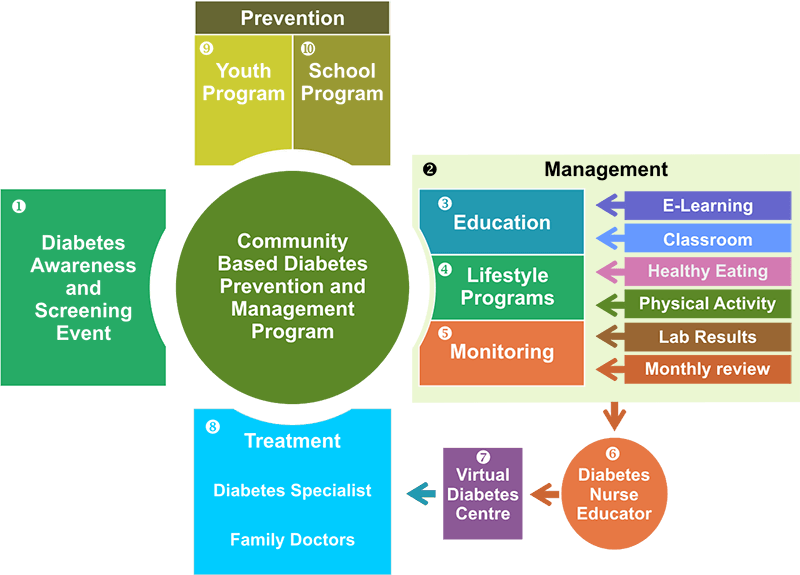
Mobile Diabetes Clinic
Virtual Diabetes Centre
Among the major challenges facing remote community is access to healthcare, particularly diabetes specialists. We developed the Virtual Diabetes Centre to provide local community nurses with a user friendly diabetes clinic visit forms allows nurses to interview patients and record medical data that generates professional reports for virtual access by healthcare providers from anywhere and recommend treatments based on current and historical medical records.
Virtual Diabetes Center's Diabetes Case Management enables immediate transfer of this information to consultants in Endocrinology and Ophthalmology. As a result, complete recommendations for changes in therapy are provided “on line,” via a secure system to the primary care physicians. For more information please visit the Virtual Diabetes Centre website.

Outcome
Regular monitoring of blood sugar levels and blood pressure was accomplished. Notable changes in lifestyle, particularly in diet and physical activity (e.g. formation of the walking club), and reduction of A1c levels was achieved. The impressive reduction in diabetes clinical parameters achieved (A1c, Lipids, BP, etc.) would be predicted to result in major reductions in renal impairment, cardiovascular disease, other disabilities, and hospitalization costs downstream in the Diabetes and My Nation group.
However, the striking finding of the improvement in the same parameters in the community as a whole in those who did not participate in the intense program, demonstrated the spill-over effect of such a program in the community as a whole. Over the same time period, this program advanced the care of First Nations people significantly compared to the care of people in the adjacent community of non-First Nations people. The entire community now demonstrates a remarkable understanding and awareness of the risks of this disease and of methods to reduce this risk.
This program has demonstrated that Diabetes Nurse Educators must play an integral part in the implementation of the program as the main point of contact for monitoring patients and coordinating treatment activities. They provide intimate motivational access to healthcare which permits alternative and cost effective approaches to all aspects of diabetes management.
Finally, this program has demonstrated that e-health for education and monitoring of patients must be applied to sustain the quality of services as the number of people with diabetes is increasing at an alarming rate not matched by the increase in human or financial resources to deal with it.
The Programs

Managing chronic diseases such as diabetes requires a comprehensive approach that addresses all aspects from motivation to education, screening, monitoring, treatment, and adoption of healthy lifestyle. It also requires the infrastructure support from the healthcare team and services to funding and information technology. These requirements applies to each individual with diabetes on the micro level and also to any community based initiative on the macro level. Overall all of these activities must address the culture and level of readiness to receive and apply these programs on the individual and community levels. Community based programs must also addresses prevention and management, including all age groups. Although it sounds like a massive task, the key is integrating these activities within existing programs.
Diabetes and My Nation model consists of different integrated programs, these programs evolved through the interaction with different communities and individuals; these programs could apply as is to a specific community or modified to meet that community settings from available resources to culture.
Managing and preventing chronic diseases is not a short term initiative, it is long term, there is no cure for diabetes, individual with diabetes need support and monitoring for the rest of their life, also the programs they adopt has to evolve as they age; therefore, it is preferred that any program to be self sustained by the individual and/or communities.
Diabetes Awareness and Screening
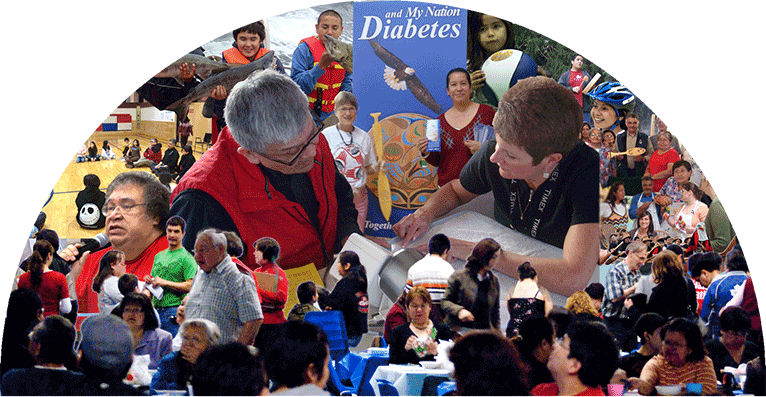
The diabetes awareness and screening gathering is a community event to share traditional food and activities, share knowledge about diabetes from healthcare professionals and community members, and provide community members an opportunity to test if they have or at risk of developing diabetes.
Objectives
- Increase awareness about diabetes and its potential health complications;
- Invite community members to participate in the program;
- Build relation and trust with the community;
- Promote traditional activities and traditional diet;
- Build bridges between the community and the health care professionals in the region; and
- Promote cooperative activities between the community and local businesses.
These gatherings are held at each of the First Nations communities where community members shared traditional food, dancing and singing. They also shared knowledge about diabetes and how to prevent and manage it, applying traditional healing and modern medicine. These events presented opportunities for local healthcare providers and local services for building bridges with the communities. Screening for diabetes was carried out by a certified healthcare professional from healthcare authorities and/or local pharmacies and healthcare workers. At the end of the awareness gathering, community members were invited to join the Circle of Diabetes Self-Management, physical activity and nutrition programs, and diabetes educational activities.
Screening
Screening is carried out by certified healthcare workers for the following: Blood Sugar, Blood Pressure, A1c (if Blood Sugar level is over 11.1 mmol/L or the person has Type 2 diabetes), Weight, Height, and Waist Circumference.
Diabetes and My Nation team has held diabetes awareness and screening events at the following First Nations:
- Haisla First Nation
- Kermode Friendship Society
- Lhoosk'uz Dené Nation
- Lil'wat First Nation
- Mowachaht Muchalaht First Nation
- Ooknakane Friendship Centre
- Penticton Indian Band
- Quesnel Native Friendship Centre
- Skidegate First Nation
- Sliammon First Nation
- Squamish First Nation
- Tseshaht First Nation
- East Vancouver Aboriginal Community - Friendship Centre
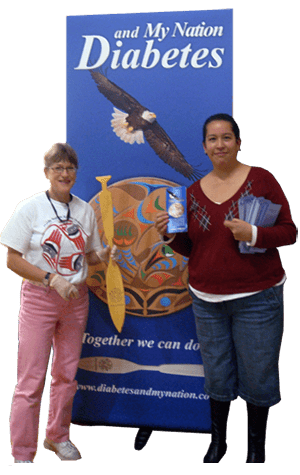
The Circle of Diabetes Self-Management


Participation of community leaders, particularly who have diabetes, is a vital component to the program success. Their involvement validates the program with the community, bring knowledge of tradition, and promote diabetes management and prevention among their families and friends. In addition, this will make them stakeholders and may assist in overcoming the negative impact of residential schools and other changes that were forced on them.
Circles and Gatherings are the most suitable forms to provide diabetes management education. They provide a safe environment where everyone is equal and is able to share their experience and develop their own goals and diabetes management plans.
This form also provides the environment for learning from their peers experience of managing their diabetes. Establish a Circle of Healing, with emphasis on diabetes management and prevention, based on the traditional ways of gathering and circles of healing.
The Circle combines education by professional healthcare providers with working experience with the Aboriginal people and traditional healing specialists; sharing of knowledge between members of the circle; and monitoring healthy eating, physical activity and personal blood sugar levels so each member of the circle benefits from education and the stories of others and can develop their own personalized diabetes self-management program.
The Circle of Diabetes Self-Management is a one year program. Each month the Circle will meet twice. At the first circle (week one), members of the circle will view one of Diabetes and My Nation DVDs or via the Internet (for example: Nutrition), and discuss among themselves what they have learned and what they commit to do (for example reduce their amount of carbohydrate intake).
In addition they will check their blood pressure, BMI and give their blood sugar meter to the Local Health Nurse or Diabetes Nurse from the health authority to collect information about their monthly blood sugar levels and monitor their progress. There will be a diabetes specialist and nutritionists who will monitor all participants and work with their healthcare providers to adjust medication or diet plans if required.
By the end of the year, members of the circle and their family and friends, will have learned what they need to know about diabetes management and prevention, traditional healing and modern medicine, and be able to establish ongoing community based physical activity programs that they will propose. In addition, they will be able to monitor the progress of their diabetes and build bridges with the healthcare system.
Youth Programs

Our Spirit Lives
A program for youth in the 14 – 20 age groups, promotes diabetes prevention through learning about their culture. In this case, this was accomplished by participating with the community in carving a canoe. They also participate in “Learn and Share” program; the youth under the supervision of community elders gather traditional food and learn about their culture and how it could prevent diabetes, they also prepare the food for their families and also share it with community elders (food security program).
Youth will produce a video to document the process and also customizing their “Diabetes and My Nation” DVD by including their traditional healing practices. They will learn about diabetes and how to prevent and manage it, take a pledge to avoid drugs, alcohol, and un-healthy food and drink; they will also participate in a traditional physical activity such as dancing, fishing, and/or hunting. Youth are also encouraged to join homework club if it is available at their community.
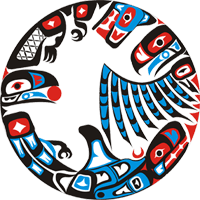
Haisla's youth program logo designed by Cassidy
Learn and Share - Haisla Youth 2009
Haisla First Nation - Canoe
School Programs

Health Warriors
The Health Warriors is a diabetes prevention educational program for students in the 10-14 age groups carried out in association with local schools. Students are invited to participate in an introductory discussion about diabetes. Each student is encouraged to learn about diabetes on their own, from elders, teachers, nurses, Internet and other sources; then share their knowledge at a community gathering in the way they prefer such as writing an essay, performing a play, drawing, singing and/or dancing, about diabetes, how it affects them and their families, and how to prevent it. Students’ presentations will be published on the Diabetes and My Nation website.
Best Practices:
- Present an outline of the program to the Principal of the School;
- Outline the benefits and procedures to the Teachers and get their input;
- Integrate the program with existing school activities;
- Meet with the students and teachers and involve them in a talk about diabetes using simple language and presentation;
- Use simple teaching tools; and
- It is extremely important to highlight that First Nation genetic structure is not bad, it was designed by the Creator for the environment and way of living. Another message is diabetes in not a death sentence, it could be prevented or delayed, and people who manage it can live healthy and happy life.
Haisla First Nation Health Warriors
Tseshaht First Nation Health Warriors
Let's Be Active

Through consultation with the elders and youth of a number of First Nations, a number of traditional and non-traditional physical activities were started. Any of these activities must be associated with diabetes education, screening, and monitoring. Among these programs are:
- Basketball Tournaments, a program initiated by the Haisla First Nation. Three Tournaments were held at the Haisla First Nation in 2008 - 2009; during each tournament. The first tournament was sponsored by ActNow BC . At the tournament the school children share their knowledge about diabetes and how to prevented with the community. Local radio station was invited to cover the games and promote diabetes prevention and management.
- Bicycle program, where the Health Department purchase a bicycle and loan it to members of the community, if they like it and decided to buy their own, they receive a gift certificate. The program was initiated at the Skidegate First Nation, and as a result 10 other nations received bicycle to start their program.
-
Wood cutting competitions, another program started at the Skidegate
First Nation, where elder shared their knowledge with the youth on wood cutting;
then the wood was distributed among the elders of the community.
-
Other programs included:
Traditional dancing and singing competitions
Walking and Dancing groups
Diabetes and My Nation Basketball Tournament
Healthy Diet

Participants of Diabetes and My Nation program share their knowledge about traditional diet through the gathering and preparing of food. Youth are encouraged to participate in these activities, particularly in food gathering. This is a vital knowledge that is transferred through generations.
A number of cooking classes are held throughout the year, non-traditional cooking classes are based on the Canadian Diabetes Association "Cooking for Life" program. Members of the community participate in community garden and good food box program.
At the Haisla First Nation, as in other nations, eliminated un-healthy food from the school, and the local grocery stores are encouraged to provide healthy food choices. In addition, a number of nations decided to serve health food only at functions sponsored by the Chief and Council.
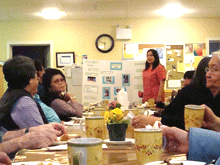
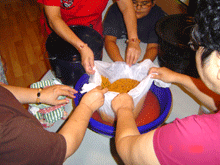
Education Programs

Developed a culturally appropriate educational program presenting a holistic approach to diabetes prevention and management. The majority of contributors were First Nations health care professionals and community members. Diabetes and My Nation educational materials (10 DVDs and website) about diabetes prevention and treatment presented in a holistic approach (Spiritual, Mental, Emotional, and Physical aspects of diabetes management).
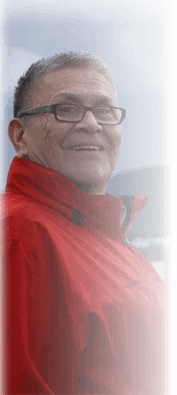
A message from Chief Robert Joseph
Our nation has faced many challenges throughout recent history. Today we are facing
a major challenge which is diabetes. It is killing us and depriving us from the
good quality of life that was provided to us by the Creator. There is nowhere I
go without meeting people with diabetes. After seeing many of my friends and family
affected by diabetes; I have decided to take action.
I started a journey of healing to learn how to manage my diabetes and live a healthy
life and fulfill the purpose the Creator has chosen for me. Throughout this journey
I learned about our traditional healing, western medicine, and how to deal with
issues such as residential schools and its impact on us. I also learned how it is
important to manage diabetes. I want to share with you my journey with you.
Let’s learn together and provide ourselves and our families with a happy and productive
life. Some of you may know a great deal about diabetes and how to manage it, while
others are in denial and or have surrendered to the disease.
I invite you all to listen to what I have learned and I hope you will take good
care of your health. Diabetes is a serious disease but manageable.
Expanded Chronic Care Model

To ensure the success of any health management initiative it has to be integrated within an established framework. The Expanded Chronic Care Model identifies essential elements in a system that strives for enhanced chronic care management. Diabetes and My Nation team worked with the Haisla First Nation to implement the Expanded Chronic Care Model, (theoretical model) as part of their overall health program. As a result, the Haisla First Nation health program was select on one of the 8 best practices in Canada in 2008 by the First Nations and Inuit Health Branch, Health Canada.
These Expanded Chronic Care Model elements include:
- The community
- The health system
- Self-management support
- Delivery system Design
- Decision support
- Human / Financial Resources
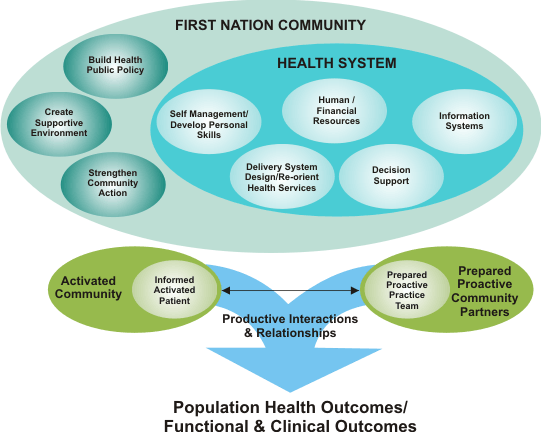
- Smoking abolition programs
- Community School’s Healthy Nutrition Policy – no vending machines
- Chief and Council resolution to implement Diabetes and My Nation
- Screening Band’s staff members for diabetes and hypertension
- Road safety and animal control - Dog Leash bylaw
Create Supportive Environment
- Hiring a part-time Diabetes Educator Nurse to ensure ongoing education, support and follow up
- Providing paid time for a staff member or members to attend the Circle of Diabetes Self-Management
- Nutrition workshops for Home Maker staff and Elder’s Coordinator resulting in weekly healthy balanced meals focusing on appropriate portion sizes, low salt and high fiber choices.
- Food security program policies for elders to be provided fish
- Prenatal national program – provides monthly financial support for prenatal and post natal breast feeding mothers up to 3 years. Similar services are provided for off reserve pre and post natal mothers through partnership with Child Development Program in Kitimat
- Mother Goose Program – pre and post natal parent group reinforcing healthy parent child relationships
- Literacy improvement group of children of elementary age to improve reading skills – Start Sept 2008
- Partnership with Northern Health Authority to provide up to date child hood immunization.
- Transportation – The Haisla First Nation has purchased a bus with Northern Health and City of Kitimat to allow community members to travel between the village and the city for medical & social needs
- Good Food Box Program providing healthy fruits and vegetables at lower cost thus reducing the need for high carbohydrate foods.
- Monthly Community Kitchen workshops for New Mother’s & Social Development clients focusing on healthy eating, balanced meals, healthy portions sizes & food preparation skills to prevent future diabetes
- Community Health Nurse provides ongoing education and supplies to raise awareness of STI’s, HIV, Hepatitis, infection control hand washing workshops, head lice assessments.
- Community Health Nurse arranges dental, hearing, vision screening in community school
- EHO partnership with staff for weekly water testing, promotion of food safe courses
- HR Manager coordinates yearly First Aide training for all Council staff
- Recreational Coordinator and staff oversee the functioning of community recreational gym and weight facility, varying operational hours to meet the needs of the community.
- Recreational Coordinator arranges ongoing physical activity classes for all ages and the local Recovery Treatment Centre
- Community Pandemic Plan – educate the community in the event of a wide spread communicable infection. Each Haisla family received a pandemic kit.
Strengthen Community Action
- Community groups recruited adults, youths, healthcare team members,, social work team members and school boards to participate in the design of Diabetes and My Nation activities and its implementation.
- Promoted health management through traditional activities and empowerment (through a project to build a Canoe which involved community members of different age groups.)
- Community health fair, workshops, and awareness events. The Haisla First Nation hosts an annual health fair
- Experts in diabetes management related areas participate in the Circle of Diabetes Self-Management in person and via videoconferencing utilizing Health Canada E-health system.
- Five Year Wellness Community Plan promoting a healthy mind, body and spirit – covering topics such as: generational trauma resulting from residential schools by Jane Middleton Moss, renowned author and psychologist , Women’s abuse issues, health care professional educational sessions on “Building the Strength Within us” by Rebecca Martel
- Partnership with Northwest Counseling to provide counseling services to school and all community members and staff
- Memorial Garden initiated to bring the community together recognizing community loss & celebrate the life of a loved one. A beautiful garden was established in front of the community school with a plaque honoring those who past on.
- Community fundraising events ongoing towards the building of a Community Elder’s Care Facility
- Basketball tournament to promote diabetes prevention and management
- Walk for diabetes (planned for November 2008)
- Homecare program
- Homework club for youth
- Investment club for youth
- Educational Materials - Diabetes and My Nation DVDs and website. A culturally appropriate multimedia educational program presented a holistic approach to diabetes prevention and management.
- Diabetes Awareness and Screening Gathering - a community event to share traditional food and activities, share knowledge about diabetes from healthcare professionals and community members, and provide community members an opportunity to test if they have, or at risk of developing, diabetes. Screening included random glucose. If it test was higher than (8 mmols/l) or if they have known diabetes, their A1c was tested By Point-of Care testing. Other tests included blood pressure, BMI, and lipids to complete a Metabolic Syndrome profile.
- The Circle of Diabetes Self-Management - a one year program. Each month the Circle will meet twice. At the first circle (week one), members of the circle will view one of Diabetes and My Nation DVDs (for example: Nutrition), and discuss among themselves what they have learned and what they commit to do (for example reduce their amount of carbohydrate intake). On the third week of the month, the circle will meet again to share what they have achieved and what difficulties may have prevented them from achieving their goals. These goals adhere to evidence-based practice guidelines. Home blood glucose meters will be used to document glucose status as lifestyle changes evolve. An expert on related subject matter will be invited, either in person or through video conference, to answer questions and share knowledge. Members will also participate in a physical activity program and/or cooking lessons. In addition they will check their blood pressure, BMI and give their recording blood sugar meter to the Local Health Nurse or Diabetes Nurse from the health authority to collect information about their monthly blood sugar levels and to monitor their progress. A diabetes nurse educator, diabetes specialist, and nutritionist monitor all participants and work with them to adjust their diabetes management program and with their healthcare providers to adjust medication or diet plans if required. By the end of the year, members of the circle and their family and friends will have learned what they need to know about diabetes management and prevention, combining traditional healing and modern medicine, and be able to establish ongoing community based physical activity programs that they themselves will choose. In addition, they will be able to take an active and central role in managing their health, monitor the progress of their diabetes, goal-setting, problem-solving, and build bridges with the local healthcare system.
- Evidence: The number of participants has averaged 14 at each Circle. Regular monitoring of blood sugar levels and blood pressure has been accomplished as well as noticeable changes in lifestyle, particularly in diet and physical activity (e.g. formation of the walking club and observing a reduction of A1c levels to 6.9% in six participants from significantly elevated levels documented at onset.
- Youth Diabetes Prevention program “Our Spirit Lives” – A program for youth in the 14 – 20 age groups, promotes diabetes prevention through learning about their culture. In this case, this was accomplished by participating with the community in carving a canoe. Youth will produce a video to document the process and also customizing their “Diabetes and My Nation” DVD by including their traditional healing practices. They will learn about diabetes and how to prevent and manage it, take a pledge to avoid drugs, alcohol, and un-healthy food and drink; they will also participate in a traditional physical activity such as dancing, fishing, and/or hunting. Youth are also encouraged to join homework club if it is available at their community.
- Evidence: The youth team participated in “Learn and Share” program to gather and prepare traditional food for their families and community elders while learning and sharing knowledge about diabetes prevention and management. They will also participate in wood cutting and distribution program to promote traditional physical activity.
- Behaviour changes and motivation: At the beginning of the project, four youth from the Haisla First Nation joined the program, today they are twelve. Changes in behaviour included the reduction (in some cases elimination) of soft drinks and “power” drinks, following a healthy diet with elimination of white flour and sugar. Members of the group joined traditional physical activities such as canoe building, dancing, and food gathering; also some of the group members joined physical activity programs at the community gym. In addition to increased physical activity and healthy diet, the group members joined a Homework club and Investment club that were established by their Nation. The main motivation is to take responsibility, to learn and apply traditional customs, and to share their knowledge with the community by producing a DVD about diabetes prevention and management.
- Children Diabetes Prevention Education Program “Health Warriors” - An educational program was established for students in the 10-14 age groups in association with local schools. Students were invited to participate in an introductory discussion about diabetes. Each student was encouraged to learn about diabetes on their own, from elders, teachers, nurses, Internet and other sources; then share their knowledge at a community gathering in the way they prefer such as writing an essay, performing a play, drawing, singing and/or dancing, about diabetes, how it affects them and their families, and how to prevent it.
- Behaviour changes and motivation: Students were motivated by the concept of research and expressing their knowledge in their own way. At Haisla First Nation, the school eliminated un-healthy food, and started a walking program every morning.
-
Diabetes and My Nation utilizes the Chronic Diseases Management (“CDM”) Tool Kit to provides access to client data for timely care, reminders, and feedback for patients and providers
-
Diabetes and My Nation developed a simple database of people who were screen for diabetes and hypertension during the Diabetes Awareness and Screening Gathering to identifies relevant subpopulations for proactive care
-
The local diabetes nurse shares the information with local family physicians and designated diabetes specialist to coordinate care
-
The CDM Tool Kit and the database are used to monitor quality improvement efforts in practice and care systems; validate new integrated programs/services; measure broad based outcomes on health and well-being, as well as, clinical outcomes
-
The diabetes nurse is working with the Ministry of Health on required modification of the CDM Tool Kit to meet the requirements of Diabetes and My Nation
-
VPM key allows remote access to nurse educator’s home computer work station and northern health lab data base thus providing up to date and timely reporting of information to clients & reduces self management time
- Focus on teamwork, each team member has defined roles and tasks. The concept of canoe journey is used as a guide for project management
- Using planned interactions to support evidence based care. Most of the initiative activities are carried out applying traditional ways. For example the Circle of Diabetes Self-Management is conceptually similar to the Diabetes Talking Circle that has been successfully applied in the United States
- Ensure regular follow up by care team to ensure patients are not left on their own between visits. The diabetes nurse is visited regularly by the members of the Circle
- Provide or support case management services for complex patients. Bring the team to deal with multiple goals.
- Build relations between healthcare providers and communities / patients. Healthcare providers were invited to the Diabetes Awareness and Screening Gathering.
- Follow-up on all members of the Circle and management of their diabetes
- Training of home care team on providing foot care services to community elders
- The local diabetes nurse facilitates individual care planning
- Partnership with other healthcare providers from public and private sectors
- Integrate Diabetes and My Nation with other health programs such as the Mobile Diabetes Clinic and Northern Health Aboriginal Health Collaborative
- Integrate clinic guideline, the Canadian Diabetes Guidelines. A set of best cultural and management practices that were developed by the initiative’s team to assist in implementing the activities of the initiative
- Support healthcare team by a diabetes specialist
- Share guidelines with patients, through their healthcare team, educational materials, and guest speakers; to encourage their participation
- Integrate practice guidelines into health promotion and prevention activities
- Use traditional education methods in combination with DVDs/web-based tools
- Identify required human resources and gaps.
- The Haisla First Nation hired a part-time diabetes nurse
- Training of home-care team to assist with the initiative
- Presentation to local family physicians
- Culture training for healthcare providers and Diabetes and My Nation team
Financial Resources
- Funding from FINHB for the pilot project
- Northern Health funding for A1c test cartridges
- Private funding, this include donation of A1c diagnostic system, donation of A1c test cartridges and glucose meter test strips for the Awareness and Screening event, donation of gifts and prizes by local businesses
- Initiation of efforts to have Industry support this initiative directly by provision of required but not financially supported medication including insulin where necessary
Partners

Diabetes is not only a medical problem. It is a socio-economic challenge to the community. A successful diabetes prevention and management program must integrate all aspects that affect the person with diabetes, from motivation to social support with constant monitoring by the health care professionals. It is not only the responsibility of health authorities; it is the responsibility of all stakeholders, from families, community leaders, educational authorities, sports and healthy living groups and industries. Empowerment of patients through culturally appropriate education, supporting the communities through establishing an infrastructure of trained healthcare providers and healthcare system, and developing long-term strategies are the key components to the comprehensive diabetes prevention and management program.
Acknowledgment
Diabetes and My Nation team would like acknowledge the First Nation and Inuit Health Branch for funding the pilot project of this model, Vancouver Coastal, Interior, Vancouver Island, North Health Authorities, and BC Ministry of Sports and Healthy Living and ActNow BC for their support. Also Merck Frosst Canada, GSK, LifeScan, and Shopper Drug Mart were among the supporter of the initial stages of the program. Siemens Canada donated 4 DCA 2000 analyzers to the communities. Special thanks to the Sliammon First Nation; and the Haisla First Nation and Haisla people, and their Chief and Council and the Health Department, Social Department and School; and all other First Nations in BC and members of the community, and volunteers who have participated in the pilot project of Diabetes and My Nation.
Diabetes Task Force Solutions
Our philosophy is based on empowerment and motivation of patients to play a leading role in managing their chronic diseases through culturally sensitive and holistic self-education interactive education programs; providing healthcare professionals with innovative technology based tools for better treatment and monitoring of patients; and integrated solutions for healthcare services to cost effectively manage their resources while providing efficient services to the clients. Read more..

Working together to improve diabetes care
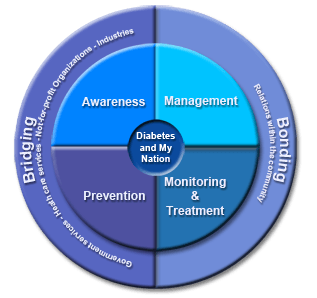 Diabetes and My Nation initiative is a community based health management program to achieve evidence based outcomes for the prevention and management of diabetes (Type 2 diabetes Mellitus – T2DM) in First Nations communities. It applies culturally appropriate and holistic methods, and includes all age groups including youths but not infants in the community.
Diabetes and My Nation initiative is a community based health management program to achieve evidence based outcomes for the prevention and management of diabetes (Type 2 diabetes Mellitus – T2DM) in First Nations communities. It applies culturally appropriate and holistic methods, and includes all age groups including youths but not infants in the community. 
